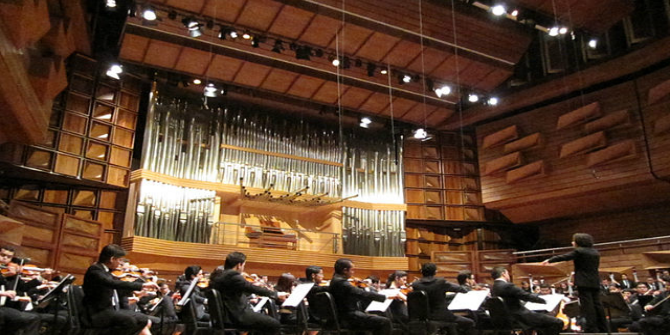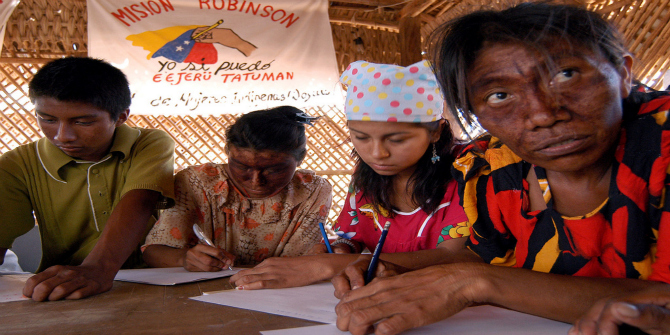In Sonorous Worlds: Musical Enchantment in Venezuela, Yana Stainova presents an ethnography of the participants in El Sistema, a state-funded music education programme for disadvantaged children and youth in Venezuela. This book is a rich and sensitive account of the everyday transformation experienced by students in one of the world’s most renowned and polarising classical music programmes, writes Harry Rodgers.
Sonorous Worlds: Musical Enchantment in Venezuela. Yana Stainova. University of Michigan Press. 2023.
 El Sistema, the state-funded institution that provides classical music education to some of Venezuela’s most marginalised youth, has long attracted international attention from musicians, politicians, academics, and journalists, with attempts to replicate its successes across the world. In Sonorous Worlds: Musical Enchantment in Venezuela (2023), Yana Stainova offers an exceptionally rich view into El Sistema through the eyes of her interlocutors, largely the young musicians. Stainova’s primary argument is that the impact of El Sistema on Venezuelan society is more complex than previous work suggests and is underpinned by the notion of “enchantment”. Focusing on the positionality of the musicians training within the organisation, Stainova contends that enchantment is at the heart of how they explain their dedication to music. It also proves central to Stainova’s ethnographic method, providing a means of understanding diverse experiences of participation within El Sistema.
El Sistema, the state-funded institution that provides classical music education to some of Venezuela’s most marginalised youth, has long attracted international attention from musicians, politicians, academics, and journalists, with attempts to replicate its successes across the world. In Sonorous Worlds: Musical Enchantment in Venezuela (2023), Yana Stainova offers an exceptionally rich view into El Sistema through the eyes of her interlocutors, largely the young musicians. Stainova’s primary argument is that the impact of El Sistema on Venezuelan society is more complex than previous work suggests and is underpinned by the notion of “enchantment”. Focusing on the positionality of the musicians training within the organisation, Stainova contends that enchantment is at the heart of how they explain their dedication to music. It also proves central to Stainova’s ethnographic method, providing a means of understanding diverse experiences of participation within El Sistema.
Stainova adopts an acutely reflexive stance, drawing on her own experiences as a pianist, as a child growing up in post-communist Bulgaria, and as an anthropologist
Sonorous Worlds is divided into four parts: i. Music, ii. Enchantment, iii. Aspiration, and iv. Power. These are further divided into twenty short chapters, each of which explores a different facet of the lives of the musicians or functioning of El Sistema. Drawing upon fieldwork conducted between 2010 and 2018, Stainova goes beyond a reading of the institution, the world-renowned musicians it has produced, or the reported social impacts attributed to El Sistema. She instead takes a thorough ethnographic approach to the lives of the individual musicians partaking in El Sistema – many of whom are profoundly marginalised barrio residents. Stainova adopts an acutely reflexive stance, drawing on her own experiences as a pianist, as a child growing up in post-communist Bulgaria, and as an anthropologist. Each facet contributes significantly to her methodological approach.
Stainova provides necessary context to El Sistema and the musicians through exploring the socio-political landscape of Venezuela, and the so-called Bolivarian Revolution.
As Stainova states, “on arrival, I quickly found that reducing the musicians’ collective engagement with music to measurable consequences, such as upward mobility and declines in rates of poverty and everyday violence, flattened the depth and intensity of these relationships” (8). This core point is expanded upon throughout the introduction, where Stainova provides necessary context to El Sistema and the musicians through exploring the socio-political landscape of Venezuela, and the so-called Bolivarian Revolution. Sonorous Worlds is positioned in this context and works with the musicians to understand how creativity and the skills associated with learning and performing music collectively are deployed not just in response to these conditions, but in spite of them. She summarises, “music practice gives us an understanding of how people experience the systemic forces that govern their lives, such as states, institutions, and social exclusion. […] Music practices emanate their own forms of power that act within and beyond the systemic forces that attempt to control them” (13).
The musicians and their families often hold seemingly outlandish dreams far removed from their current lived experience, such as playing in the Berlin Philharmonic Orchestra
Part i. Music opens by exploring how music fits into the lives of the musicians, particularly in the context of everyday crisis and the affective impact that music has upon them. Stainova explains that social contexts are crucial to understanding how young people function as practicing musicians. With many of the musicians treating music as an apolitical sensory experience, despite their lived experience, Stainova explains how severing the links between music making and their social realities is deeply political itself, where discontentment in everyday life is channelled towards creating music, “turning frustration into positive aspiration” (37). The musicians and their families often hold seemingly outlandish dreams far removed from their current lived experience, such as playing in the Berlin Philharmonic Orchestra. She compellingly demonstrates how these dreams function within systems, and that in these moments in which they can temporarily suspend their social circumstances – to dream bigger – her interlocutors are able to imagine a future far removed from current realities. A poignant example is found between herself and a musician who gestures towards a sprawling barrio outside of El Sistema’s central campus. Stainova remarks on the sadness of poverty, only to find her interlocutor was in fact gesturing to the beauty of a mango tree. “I would allow Nahia to teach me to inhabit that perspective – to more intensely see and feel the processes of flowering and creation in the midst of precarity and destruction” (45).
El Sistema participants receive wages provided by the state and the organisation has been accused of legitimising the Venezuelan government on the international stage
Part iv. Power, is where the book comes together and solidifies many of the core arguments. Here Stainova explores how the state functions in relation to El Sistema and its musicians, as well as how the musicians navigate this relationship. El Sistema has managed to survive by continuing to receive funding from successive, politically opposed, governments. With the deepening economic crisis, and criticisms of the government’s human rights violations, critics of El Sistema have lamented those within the institution as being complicit through political silence. El Sistema participants receive wages provided by the state and the organisation has been accused of legitimising the Venezuelan government on the international stage.
Here, Stainova masterfully deploys her concept of “deep-listening” as a means to read beyond this ‘political silence’ and detect hidden movements and sounds of resistance:
…silence is conceptualised as sound below the threshold of hearing for human beings, […] below 20db, that may nevertheless become audible through sound amplification. Reconceptualizing silence as sound below the level of human perception implies that sharpening our sensory attentiveness would reveal the content of this silence. I see fieldwork as one such medium of sound amplification, making audible the personal and social transformation (180).
She then demonstrates how musicians continue to resist the political status quo in a myriad of ways that require some form of amplification to be perceived. These acts include covertly attending protests and voicing dissent between colleagues alongside quieter engagements such as community building, particularly across class and racial barriers, and imagining futures outside of pre-determined social constraints. All this is contextualised in an inability to openly protest due to fears of being stripped of a wage which supports them and their families, or having an instrument repossessed that would not only be unaffordable to replace but also represents their hopes for the future. This attention to silence is one of the book’s main intellectual achievements. Stainova shows how sustained fieldwork may function both to amplify the perception of practices and experiences of marginalised groups, and to offer insight into why they are so frequently misrepresented and misunderstood. This concept may prove increasingly important as we continue to question the place of anthropology in the 21st century.
A possible critique of the book is that there could have been greater attention paid to the musicians’ lives after migration
A possible critique of the book is that there could have been greater attention paid to the musicians’ lives after migration. The final chapter, occurring years later in Paris, was a welcome and moving return to some of the key protagonists, though it felt as though there was still more to explore in these moments. That said, this monograph is already densely packed with rich ethnographic encounters and aims to provide a nuanced account of those participating in El Sistema, rather than a systematic study of contemporary Venezuelan migration.
Overall, Sonorous Worlds offers a rich and moving account of students operating within one of the world’s most renowned and polarising classical music programmes operating in a political context that is no less polarising. Stainova compellingly demonstrates the successes and failings of the organisation by focusing on the everyday transformation that occurs within young musicians’ lives. The book will be of interest to scholars and students of Latin America, anthropology and ethnography, music, and pedagogy. It offers a highly engaging addition to any reading list intended to demonstrate the value of contemporary anthropology and ethnography in diverse settings.
Note: This review gives the views of the author, and not the position of the LSE Review of Books blog, or of the London School of Economics and Political Science. The LSE RB blog may receive a small commission if you choose to make a purchase through the above Amazon affiliate link. This is entirely independent of the coverage of the book on LSE Review of Books.
Image credit: Sara Armas on Shutterstock







